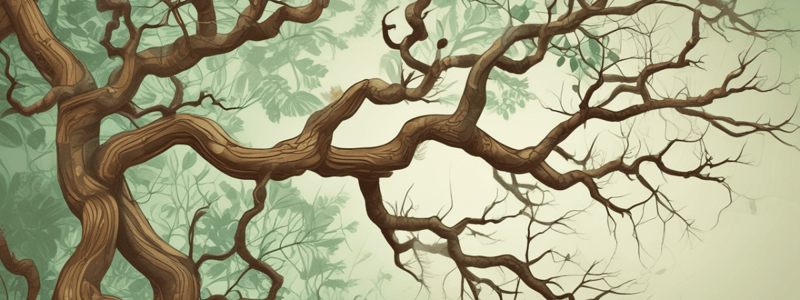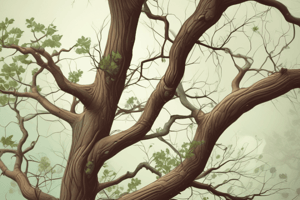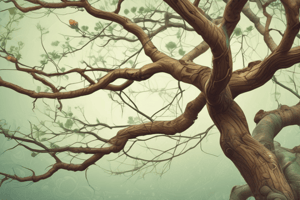Podcast
Questions and Answers
Match the following branches of biology with their definitions:
Match the following branches of biology with their definitions:
Ecology = Study of interactions between organisms and their environment Botany = Study of plants Microbiology = Study of microorganisms Molecular Biology = Study of biological processes at the molecular level
Match the following cellular components with their functions:
Match the following cellular components with their functions:
Plasma membrane = Regulates what enters and leaves the cell Cytoplasm = Site of cellular metabolic reactions Nucleus = Contains genetic material Mitochondria = Site of cellular energy production
Match the following genetic terms with their definitions:
Match the following genetic terms with their definitions:
DNA = Genetic material Genes = Segments of DNA that code for proteins Traits = Characteristics determined by genes Inheritance = Passing of traits from parents to offspring
Match the following mechanisms of evolution with their descriptions:
Match the following mechanisms of evolution with their descriptions:
Match the following ecosystem components with their roles:
Match the following ecosystem components with their roles:
Match the following ecology terms with their definitions:
Match the following ecology terms with their definitions:
Flashcards are hidden until you start studying
Study Notes
Branches of Biology
- Botany: study of plants
- Zoology: study of animals
- Microbiology: study of microorganisms
- Ecology: study of interactions between organisms and their environment
- Biochemistry: study of chemical processes in living organisms
- Molecular Biology: study of biological processes at the molecular level
- Genetics: study of heredity and variation
- Evolutionary Biology: study of evolution and diversity of life
Cell Biology
- Cell: basic unit of life
- Cellular components:
- Plasma membrane
- Cytoplasm
- Nucleus
- Mitochondria
- Endoplasmic reticulum
- Ribosomes
- Cell membrane functions:
- Regulates what enters and leaves the cell
- Maintains cell shape
- Separates cell from environment
Genetics
- DNA (Deoxyribonucleic acid): genetic material
- Genes: segments of DNA that code for proteins
- Traits: characteristics determined by genes
- Inheritance patterns:
- Dominant and recessive traits
- Autosomal and sex-linked traits
- Polygenic inheritance
Evolution
- Theory of evolution: explains diversity of life
- Mechanisms of evolution:
- Natural selection
- Genetic drift
- Mutation
- Gene flow
- Evidence for evolution:
- Fossil record
- Comparative anatomy
- Molecular biology
Ecology
- Ecosystems: interactions between biotic and abiotic factors
- Energy flow:
- Producers (plants)
- Consumers (herbivores, carnivores, omnivores)
- Decomposers
- Population dynamics:
- Growth and decline
- Limiting factors
- Carrying capacity
Branches of Biology
- Botany is the study of plants
- Zoology is the study of animals
- Microbiology is the study of microorganisms
- Ecology is the study of interactions between organisms and their environment
- Biochemistry is the study of chemical processes in living organisms
- Molecular Biology is the study of biological processes at the molecular level
- Genetics is the study of heredity and variation
- Evolutionary Biology is the study of evolution and diversity of life
Cell Biology
- Cells are the basic unit of life
- Plasma membrane is a cellular component that regulates what enters and leaves the cell
- Cytoplasm is a jelly-like substance inside the cell where many metabolic processes take place
- The nucleus is the control center of the cell where DNA is stored
- Mitochondria are the powerhouses of the cell where energy is produced
- Endoplasmic reticulum is a network of membranous tubules and sacs involved in protein synthesis and transport
- Ribosomes are small organelles found throughout the cytoplasm where protein synthesis takes place
- Cell membrane maintains cell shape and separates the cell from its environment
Genetics
- DNA (Deoxyribonucleic acid) is the genetic material that contains the instructions for the development and function of an organism
- Genes are segments of DNA that code for proteins
- Traits are characteristics determined by genes
- Dominant and recessive traits are two types of inheritance patterns
- Autosomal and sex-linked traits are two types of inheritance patterns
- Polygenic inheritance is the phenomenon where multiple genes contribute to a single trait
Evolution
- The theory of evolution explains the diversity of life on Earth
- Natural selection is the process by which populations adapt to their environment
- Genetic drift is the random change in the frequency of a gene in a population
- Mutation is a change in the DNA sequence of an organism
- Gene flow is the movement of genes from one population to another
- The fossil record provides evidence for evolution
- Comparative anatomy provides evidence for evolution
- Molecular biology provides evidence for evolution
Ecology
- Ecosystems are interactions between biotic and abiotic factors
- Producers (plants) are organisms that convert sunlight into energy through photosynthesis
- Consumers (herbivores, carnivores, omnivores) are organisms that obtain energy by consuming other organisms
- Decomposers are organisms that break down dead organic matter
- Population growth and decline are influenced by limiting factors such as food, water, and habitat
- Carrying capacity is the maximum population size that an environment can support
Studying That Suits You
Use AI to generate personalized quizzes and flashcards to suit your learning preferences.




